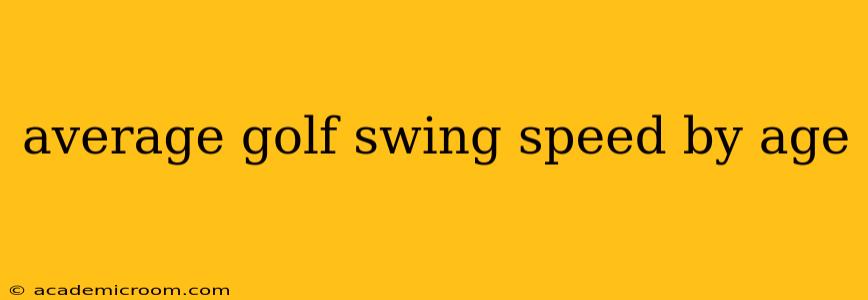Golf is a game of skill and precision, and swing speed plays a crucial role in determining distance and overall performance. Understanding the average golf swing speed by age can help golfers of all levels set realistic goals, track their progress, and tailor their training accordingly. This guide provides a detailed breakdown of typical swing speeds, along with factors influencing them and how to improve your own.
What is the Average Golf Swing Speed for Men?
The average golf swing speed for men varies significantly depending on age and playing level. Generally, younger men tend to have higher swing speeds due to greater physical strength and flexibility. However, experience and proper technique can significantly impact speed regardless of age. While precise figures are difficult to pinpoint due to varying methodologies and sample sizes, a general guideline could be:
- Young Adults (18-29): Often exhibit speeds in the 90-100 mph range, with some exceeding 100 mph.
- Middle-Aged (30-49): Speeds may fall slightly, averaging around 80-90 mph, although many maintain speeds comparable to younger players.
- Older Adults (50+): Swing speeds may decrease further, often ranging from 70-80 mph, but significant variation exists based on fitness levels and training.
It's crucial to remember these are averages; many men outside these ranges play excellent golf.
What is the Average Golf Swing Speed for Women?
Similar to men, women's average golf swing speeds vary by age and experience. Women generally have lower swing speeds than men, primarily due to differences in average physical strength. However, proper technique and dedicated training can greatly improve a woman's swing speed and distance. A general estimate:
- Young Adults (18-29): Average speeds might fall within the 70-80 mph range.
- Middle-Aged (30-49): Speeds may slightly decrease, averaging around 60-70 mph.
- Older Adults (50+): Averages might range from 50-60 mph.
Again, these are broad estimates, and individual variation is expected.
How Does Age Affect Golf Swing Speed?
Age significantly impacts golf swing speed due to several interconnected factors:
- Muscle Strength and Power: As we age, natural muscle loss (sarcopenia) occurs, impacting the power generated during the swing.
- Flexibility and Range of Motion: Reduced flexibility limits the range of motion, hindering the ability to generate optimal swing speed.
- Reaction Time and Coordination: Age-related declines in reaction time and hand-eye coordination can negatively influence swing accuracy and speed.
However, maintaining an active lifestyle, engaging in regular strength training and flexibility exercises, and focusing on proper swing technique can effectively mitigate these age-related declines.
How Can I Improve My Golf Swing Speed?
Improving your golf swing speed is achievable through a multifaceted approach:
- Strength and Conditioning: Focus on exercises targeting the core, legs, and shoulders to enhance power generation.
- Flexibility Training: Regular stretching and flexibility exercises help maintain a full range of motion during the swing.
- Proper Swing Technique: Working with a golf professional to refine your swing mechanics is paramount. Small adjustments can significantly impact speed and distance.
- Training Aids: Various training aids, like speed trainers, can assist in developing muscle memory and improving swing speed.
Remember, gradual improvement is key; avoid pushing yourself too hard to prevent injuries.
What Factors Other Than Age Affect Golf Swing Speed?
Beyond age, other factors play a significant role:
- Physical Fitness: Overall physical fitness directly correlates with swing speed. Regular exercise improves strength, endurance, and flexibility.
- Swing Technique: Correct technique is paramount. A well-executed swing maximizes power transfer, significantly impacting speed.
- Club Selection: Using the appropriate club for the shot optimizes speed and distance.
- Genetics: Individual genetic factors influence muscle composition, strength potential, and overall athleticism.
By understanding the average golf swing speeds by age and the factors influencing them, golfers can set realistic goals and develop a personalized training plan to improve their game. Remember to consult a healthcare professional or certified golf instructor before starting any new training program.
